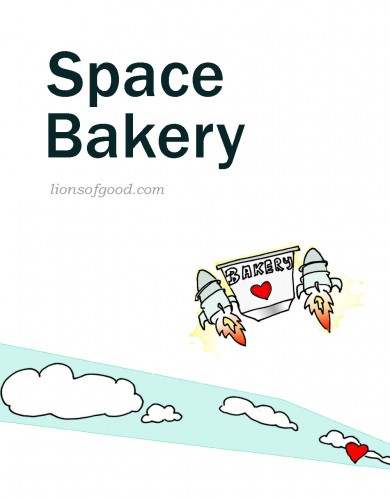
You can’t always count on being this lucky
Dear J,
Over the Christmas break, I had a whole day with you because mom had to work. We went to the Children’s Discovery Museum. You were a riot as usual. I’m proud to say I survived.
It was the day after Christmas — it was packed with parents who had no idea what to do with their kids because daycare was closed. Surprisingly, these parents were worse than the kids. A few of them ran you over because they weren’t used to looking out for children by their knees.
On our way back to the car, we saw a kid bolt out of the Children’s Discovery Museum. At first the parents were shouting his name. It sounded like they were asking him to stop running. Can’t remember what his name was, so let’s say they were shouting, “Lucas! Lucas!” His dad jogged after him. His dad looked fit, so I wasn’t sure why he didn’t run faster, because I glanced up and saw the major intersection: traffic lights, cars, buses and train tracks.
I looked back at the kid. He was sprinting as if Marshmallow Man exploded into robots and unicorns in front of him. I looked back to see how his dad was doing, and quickly concluded that his kid was going to reach the road before him.
Soon, the dad’s and mom’s pleading turned into terrified screaming: “LUCAAAAAS! LUCAAAAHHHHS!” I could hear in their voice, the terrible images they were starting to see in their heads. Their son got closer and closer to the road, and I saw a train whiz by. I pictured that scene in B-rated flicks where they kill off a disliked character by having him cross a street without looking, right after he insults someone.
Come on dad, time to start sprinting – he’s not stopping.
Finally, reality punched the dad in the liver and he ran at full speed, yelling “LUCAS!” When he finally grabbed the boy, they were already standing in the 1st lane of the road. Luckily for them, the light hadn’t turned green yet.
Positive thinking has its place and purpose, but you must bake your most important things into your bones as habits… or, like Lucas, a simple distraction can turn deadly. The boy was in danger because he wasn’t pounded with the habit that you never run off like that. And you never play near the road.
Habits are the cornerstones of behavior. When you have habits working for you, you will never have to rely on willpower. You should never rely on willpower anyway, if you want to get important things done. Willpower is your fair-weather friend that abandons you when you need it most.
On one hand, good habits keep you safe and healthy. On the other hand, bad habits can harm your body… and rot your mind.
I just got off the phone with Uncle Monkey. (That’s his nickname because when he called one time and I told him you knew animals. So, he made monkey sounds and you shouted, “Monkey!” and I said yes, that’s Uncle Monkey.)
We ended up talking about habits, and also, “How to set yourself up for success, even if you don’t know where you’re going.”
The simple principle is what coach Vince Lombardi hammers into all his players:
“Winning is a Habit.”
It’s not about giving something a shot, hoping luck smiles on you and giving up if it didn’t work. It’s paying your dues and constantly improving yourself until you can’t help but be successful.
It’s no surprise that Lombardi also said:
“The will to win is not nearly so important as the will to prepare to win.”
If you are not happy with where you are now, you can change the outcome.
If you want to change your outcome, you have to first change yourself.
To change yourself, you must change your habits.
You don’t need to know what you want to do yet, or have a definite goal.
You can still change your habit to make it easier for yourself to find your purpose, and to improve your odds of winning.
It’s okay if you’re unsure. You don’t have to know exactly what you need to do. Because you know the secret… that winning is a habit.
To be successful, you just need to copy the habits of happy and successful people. I don’t mean copy exactly what they do. I mean, copy their habits.
And one of the habits of successful people is reading.
Zig Ziglar said, “Poor people have big TVs, rich people have big libraries.”
And Mark Twain cautioned, “The person who won’t read has no advantage over the person who can’t.”
Your problems are not unique. Your problems are not new.
There is a deep spring of human knowledge and experience to drink from.
There are excellent teachers who shared great lessons; past and present.
If you don’t form a habit of reading, you’ll be stuck on the same questions, because you have no new perspectives. Reading will give you more information, and more information will help get you unstuck.
If you want to be successful, cultivate habits of successful people.
All successful people read constantly.
Besides, it’s easy to start a habit of reading. First, buy a book. Next, pick a quiet time to sit without distractions every day. Then, leave your book where you can reach for it easily at your quiet time. Finally, promise to read just one page each day.
You’ll automatically know more at the end each day than if you hadn’t read, and after a few good books, you will be a better person than when you started. You’ll start finding pieces of the puzzle you didn’t see before. And you’ll eventually see dots connecting and new pictures forming.
Exercise regularly, eat your vegetables, and feed your brain.
If you’re curious, the formula for creating any new habit is:
- Clearly define your end goal
- Break down your goal into baby steps and baby goals. Don’t laugh — the trick is to make each step as tiny and effortless as possible. E.g., if your goal is to floss your teeth, a baby step can be to floss one tooth.
- Anchor or piggyback your first baby step on an existing habit. “Making time to do it” or “Making an effort to do it” will never stick. Pick a strong habit you already have, and bind your first baby step to it. E.g., “Before I brush my teeth, I will floss one tooth.”
- Reward yourself after completing your baby step. E.g., play the A-Team theme song.
- Be patient, don’t rush forward — continue reinforcing your new baby habit. Let your mind and body accept it until you do it without thinking.
- (Note: If you get stuck on any baby step, your step wasn’t small enough. Break it down further until each step is effortless.)
- Add your next baby step, slowly, until you reach your end goal. Congratulations! You have tricked yourself into developing a new habit, without relying on willpower!
(If you’re sharp, you might notice that the steps above can be used for more than just creating good habits.)
Finally, the juiciest hidden benefit of developing a habit is inertia. It’s hard to get going when you’re at rest. It’s easy to keep going once you’re in motion. When you develop a habit of reading, you are igniting the furnace of your great iron locomotive.
The magic happens once it’s going: even if you don’t know what you should be reading yet, you’re firing your train up. When you finally decide what you should be reading, it’ll be as simple as picking up a book and stepping aside and letting your habit train take over.
Oh, the other day the song “Total eclipse of the heart” came on the radio. You took it literally. Each time mama sang “turn around…” you’d spin around in circles. When the song ended, you asked mama to sing the “turn around song”, so you could keep spinning. When mama stopped signing you started singing to yourself, “Turn around… Joshie.”
More highlights: each time you open your peanut butter sandwich snack, you’ll look over your shoulder, wave your hands wildly and go, “NO, KIMI!” because you’re used to her trying to steal a bite. You’ll do this even if we’re far away from home and Kimi is nowhere close.
At the museum, you saw a big elephant sculpture. I said, “The elephant has a big trunk!” You thought, then said, “Abuelo has a big trunk!” I had to correct you, “No… Abu has a big truck… elephants have trunks. Abu has a truck, not a trunk.” Your mom thought that was funny.
Love,
Dad
P.S. – the negotiation by logic hasn’t been working well lately to get you to eat. You understand the deal, but you started refusing it. I tried songs for a while (“1 little chicken, inside Joshua’s mouth… sung to the tune of 10 Little Indians), and you’d giggle and it worked for a few nights, but that ran out of steam too.
The latest thing that worked was using peer pressure. I showed you that all your friends in your books were eating… all your stuffed toy friends were eating… baby was eating, Elmo was eating, Bear was eating. I explained it was dinner time and they were hungry, and I had you help feed all of them. Kinda like what we do for bedtime. You felt comfortable knowing it was what everyone else you cared about did, so you did it too.
Nelson Mandela could negotiate peace, but he couldn’t save his marriage. That says something about how tough it is to negotiate relationships. But, I think anyone would agree that there’s no tougher negotiation adversary than a toddler.
With you, each day brings new changes and new challenging negotiations. It’s tough to raise a kid without verbal or physical violence.



Add your comment: